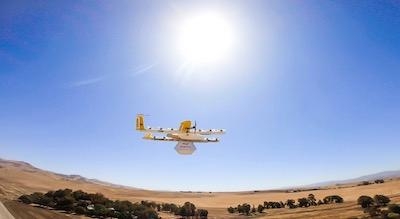Thu, Aug 04, 2022
Airworthiness Certification Replaces Weight Consideration in Accident Criteria as Board Prepares for UAV Delivery
The NTSB has addressed shortcomings in the previous definition of “unmanned aircraft accident” in a recently published rule to go into effect August 15.

The change is designed to help to address recent developments within the industry that have made the prior weight-based definition somewhat lacking when determining the board's response to aircraft accidents. Under the older definition, an “unmanned aircraft accident” was an occurrence associated with the operation of an unmanned aircraft that takes place between the time that the system is active, is associated with death or serious injury, or in which the aircraft is substantially damaged. A key dissatisfaction with the definition lay in the requirement that the UAV have a MGTOW of 300 lbs or greater, an addition that sought to limit the level of busywork sent to the NTSB after millions of drones made their way into American homes.
In May of 2021, the NTSB issued an NPRM proposing a change that would eliminate the weight requirement, instead replacing it with an airworthiness certificate or approval requirement. The NTSB said that the weight threshold is “no longer an appropriate criterion because UAS under 300 lbs are operating in high-risk environments, such as beyond line-of-sight and over populated areas. The NTSB explained that the new proposed definition would improve their ability to respond to significant safety events and advance the state of the industry as a whole, particularly in light of the expanding field of drone-based delivery services. Commercial operations using drones have been a point of concern from the public comment period, with the NTSB’s release quoting a citizen’s desire for UAS operations to be “subject to the same scrutiny as commercial manned operations.”
“A substantially damaged delivery drone may uncover significant safety issues,” says the newly released final rule. “The investigation of which may enhance aviation safety through the independent and established NTSB process. This amended definition will treat a UAS with airworthiness certification in the same manner as a manned aircraft with airworthiness certification, thereby enabling the NTSB to immediately investigate, influence corrective actions, and propose safety recommendations.”
The rule in its entirety has been published to the Federal Register under docket number NTSB-2021-0004.
More News
Also: Horizon Picks P&W PT6A, Army Buys 3 EagleNXT, First Hybrid-Electric Regional, Army Selects AEVEX Anduril Industries’ YFQ-44A Collaborative Combat Aircraft was flown>[...]
While Flying North Along The Beach At About 300 Ft Above Ground Level, The Pilot Reported That The Engine RPM Dropped To About Idle On September 28, 2025, at 1126 eastern daylight >[...]
Aero Linx: European Association of Aviation Training and Educational Organisations (EATEO) Welcome to the “ European Association of Aviation Training and Education Organizati>[...]
On-Course Indication An indication on an instrument, which provides the pilot a visual means of determining that the aircraft is located on the centerline of a given navigational t>[...]
“It also gives us the hard data we need to shape requirements, reduce risk, and ensure the CCA program delivers combat capability on a pace and scale that keeps us ahead of t>[...]
 Airborne-NextGen 11.04.25: Anduril YFQ-44A, Merlin SOI 2, UAV Rulemaking Stalled
Airborne-NextGen 11.04.25: Anduril YFQ-44A, Merlin SOI 2, UAV Rulemaking Stalled NTSB Prelim: Elmore Travis C Searey
NTSB Prelim: Elmore Travis C Searey ANN's Daily Aero-Linx (11.03.25)
ANN's Daily Aero-Linx (11.03.25) ANN's Daily Aero-Term (11.03.25): On-Course Indication
ANN's Daily Aero-Term (11.03.25): On-Course Indication Aero-News: Quote of the Day (11.03.25)
Aero-News: Quote of the Day (11.03.25)



